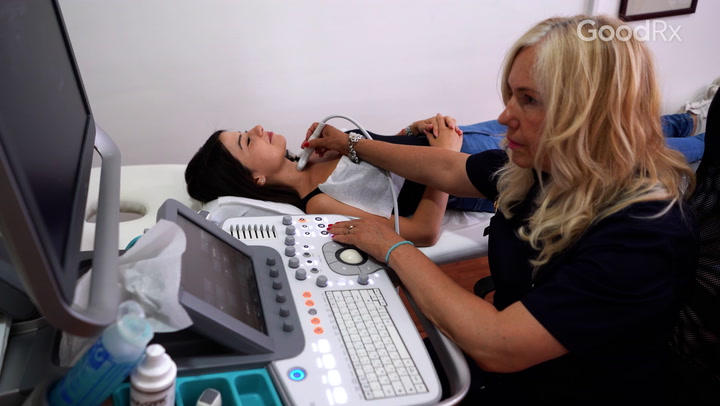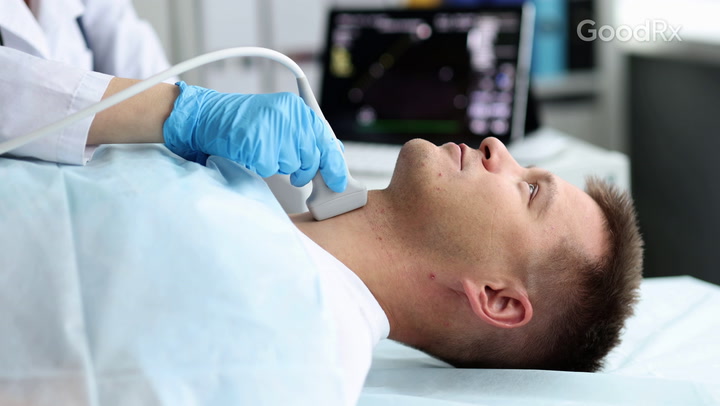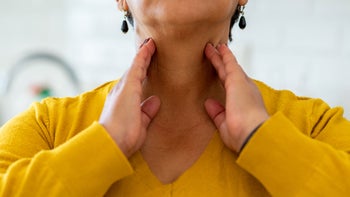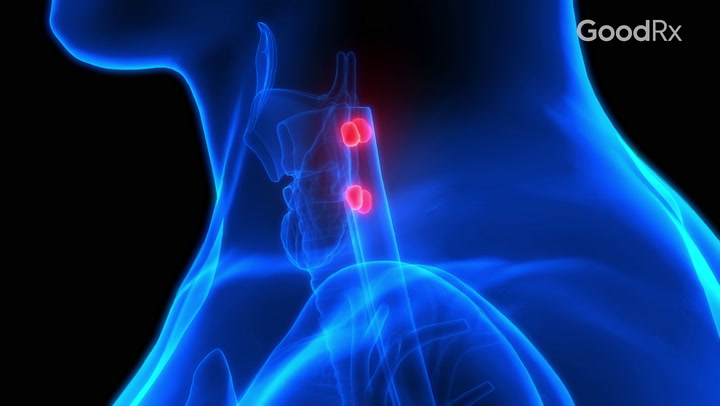
The Truth About Natural Treatments for Hypothyroidism
Key takeaways:
There are many natural treatments that claim to treat hypothyroidism. But there isn’t strong evidence that they work.
Natural treatments can help support thyroid health and overall well-being. But you shouldn’t use them instead of thyroid-hormone replacement for hypothyroidism.
Natural remedies for hypothyroidism like herbs, essential oils, and acupuncture can’t cure hypothyroidism. But they can help manage symptoms like fatigue and low energy.
Table of contents

Search the words “hypothyroidism” and “natural cures” and you’ll get millions of search results. Many sites promote everything from gluten-free diets to multivitamins to treat thyroid disease.
The problem is that many of these treatment options don’t have enough scientific research to back up their claims. Here’s what you need to know about hypothyroidism and some of the most hyped-up claims.
What is hypothyroidism?
The thyroid is a butterfly-shaped gland in the front of the neck. It makes hormones that regulate energy and chemical reactions throughout the body. Hypothyroidism (low thyroid) occurs when the thyroid gland doesn’t produce enough thyroid hormones.
Symptoms of hypothyroidism include:
Feeling tired
Feeling colder
Constipation
Drier skin
Weight gain
Muscle weakness
Muscle aches, tenderness, and stiffness
Joint pain or swelling
Thinning hair
Depression
Forgetfulness
Enlarged thyroid gland (goiter)
How do you treat hypothyroidism?
The most common treatment for hypothyroidism is the medication levothyroxine. Its brand names include:
Levoxyl
Synthroid
Tirosint
Unithroid
Diet and hypothyroidism: Learn which foods may help support thyroid health. And which foods — like dairy and soy products — might interfere with thyroid medication.
Can medications trigger hypothyroidism? Yes, and here’s what you should know about which medicines can cause drug-induced hypothyroidism.
Levothyroxine for hypothyroidism: Levothyroxine is the first-choice medication for people with hypothyroidism. We’ll review some surprising facts about this common medication.
These are all human-made versions of the thyroid hormone (T4). When you take levothyroxine, your body reacts as if it’s still producing thyroid hormones. You and your healthcare team may need to experiment with the dose before you start to feel better.
What are the best natural treatments for hypothyroidism?
There are plenty of natural solutions for hypothyroidism that claim results. But are they effective at treating hypothyroidism on their own? Most experts say “no.”
One study shows that almost 45% of people believe that alternative treatments can be used for hypothyroidism. But science tells a different story. Prescription medication is usually the key to managing hypothyroidism. Everything else is either risky or complementary.
Below, we’ll review what the science says about popular natural treatments for hypothyroidism.
Supplements
The thyroid needs vitamins and minerals to function properly. Having low levels of some of these vitamins and minerals can affect your thyroid and might even contribute to hypothyroidism.
For example, your thyroid gland needs iodine to make thyroid hormones. So low levels of iodine can lead to hypothyroidism. If you’re deficient, hypothyroidism can be treated by taking iodine supplements.
However, it’s important to know that most people get enough iodine through their diet and from table salt. So iodine deficiency is unlikely to be the cause of your hypothyroidism if you live in the U.S.
Other important vitamins for thyroid function include:
Selenium
Myo-inositol
Vitamin B12
Zinc
Vitamin A
If you don’t get enough of these vitamins in your diet, it’s possible that taking supplements may help with thyroid function. But there isn’t enough research on the topic to know for sure. And sometimes too much of a supplement — like iodine — can even be harmful for thyroid function.
If you have low thyroid levels, talk to a healthcare professional you trust before starting any supplement.
Herbs
It’s hard to know if herbs work or not for hypothyroidism. The FDA doesn’t regulate them, so it’s harder to determine if they’re safe or effective. That being said, here are a few herbs that may help manage hypothyroidism:
Ashwagandha: One small study showed that it improved thyroid function in people with a mild form of hypothyroidism.
Gum guggul: This natural remedy might help your thyroid work better by improving how it uses iodine to make thyroid hormone
Coleus forskohlii: This is an herbal ingredient found in many weight-loss supplements. Practitioners of ayurvedic medicine believe the herb helps the body create thyroid hormones.
These treatments still need more research to see if they’re effective. Always discuss herbal remedies for your thyroid with a healthcare professional.
Oils
Many essential-oil companies promise health and happiness with just a few drops of oil from a tiny bottle. But there’s no good evidence that essential oils can work as a natural remedy for hypothyroidism.
While they may not help boost your thyroid levels, essential oils might be helpful for managing some of the symptoms of hypothyroidism. For example, one study looked at women with hypothyroidism and fatigue. Those who took a blend of essential oils reported less fatigue than the group that didn’t.
Oils might help for other symptoms like sore muscles and problems sleeping.
Physical therapies
Certain types of physical therapy may soothe some hypothyroidism symptoms. But they can’t replace treatment with medication. Therapies to consider include:
Hot and cold therapy: Hot and cold therapy can ease muscle and joint pain associated with an underactive thyroid.
Yoga and meditation: Taking time to stretch, relax, and breathe may help with symptoms. But they won’t regulate your thyroid.
Acupuncture: Studies show that acupuncture can ease symptoms. It may also improve the markers used to measure thyroid hormones.
Can you naturally increase thyroid hormones through exercise?
Some people believe that you can increase thyroid levels naturally through exercise. But there’s no sound evidence that this is effective.
A review of 10 studies found that exercise didn’t have a significant effect on thyroid hormones. But exercise can help improve symptoms of hypothyroidism by improving fatigue, poor mood, and brain fog.
Can you cure hypothyroidism?
Hypothyroidism is a lifelong condition for most people. However, sometimes there are causes of hypothyroidism that can be reversed. For example, certain medications can trigger hypothyroidism. If so, hypothyroidism will usually go away when you stop taking the medication.
Pregnancy can also trigger hypothyroidism, which sometimes resolves after pregnancy. And if iodine deficiency is the cause of hypothyroidism, it can be treated with iodine alone.
But these reversible causes of hypothyroidism are rare. So, for most people, hypothyroidism can’t be cured. It can be managed with medication, which is usually taken daily.
Frequently asked questions
You don’t need to avoid specific drinks or foods if you have hypothyroidism.
Some people believe you should avoid certain foods — known as goitrogens — because they can affect your thyroid levels if you’re low in iodine. These foods include lima beans, sweet potatoes, and cruciferous vegetables. But iodine deficiency is very rare in the U.S. So most people don’t need to avoid eating these foods.
There are no vitamins you should avoid if you have hypothyroidism. But if your hypothyroidism is treated with levothyroxine, you should avoid taking certain vitamins around the same time as your medicine. That’s because these vitamins can interfere with how your body absorbs levothyroxine. Vitamins that lower the absorption of levothyroxine include calcium, aluminum, iron, and magnesium.
The most common cause of hypothyroidism is an autoimmune condition known as Hashimoto’s thyroiditis. Other causes include thyroid surgery, radiation treatment, and medications, as well as anything that causes inflammation to the thyroid gland. Sometimes, hypothyroidism is caused by a thyroid deficiency that’s present at birth. This is called congenital hypothyroidism.
The bottom line
If you’ve been diagnosed with hypothyroidism and are looking for ways to help manage your symptoms, some natural remedies — like acupuncture and physical therapy — can help. But they aren’t a replacement for medication. There’s no scientific evidence that natural treatments can cure hypothyroidism. If you’re considering them, talk to a healthcare professional you trust about how to safely incorporate them into your treatment plan.
Why trust our experts?



References
Cheng, F. (2018). An overview of the contribution of acupuncture to thyroid disorders. Journal of Integrative Medicine.
Duñabeitia, I., et al. (2023). Effect of physical exercise in people with hypothyroidism: systematic review and meta-analysis. Scandinavian Journal of Clinical and Laboratory Investigation.
Goel, A., et al. (2017). Frequent occurrence of faulty practices, misconceptions and lack of knowledge among hypothyroid patients. Journal of Clinical and Diagnostic Research.
Kunnumakkara, A. B., et al. (2018). Googling the guggul (Commiphora and Boswellia) for prevention of chronic diseases. Frontiers in Pharmacology.
Sharma, A. K., et al. (2018). Efficacy and safety of ashwagandha root extract in subclinical hypothyroid patients: A double-blind, randomized placebo-controlled trial. The Journal of Alternative and Complementary Medicine.
Singh, S., et al. (2020). Protective effect of a polyherbal bioactive fraction in propylthiouracil-induced thyroid toxicity in rats by modulation of the hypothalamic–pituitary–thyroid and hypothalamic–pituitary–adrenal axes. Toxicology Reports.
Sohn, S. Y., et al. (2024). Risks of iodine excess. Endocrine Reviews.
Takeuchi, T., et al. (2011). Treatment of hypothyroidism due to iodine deficiency using daily powdered kelp in patients receiving long-term total enteral nutrition. Clinical Pediatric Endocrinology.
Unfer, V., et al. (2023). Editorial: Dietary supplements for preserving thyroid health: The scientific evidence-based view. Frontiers in Endocrinology.

























